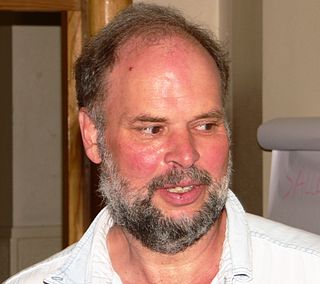Related Research Articles

The Burnside problem asks whether a finitely generated group in which every element has finite order must necessarily be a finite group. It was posed by William Burnside in 1902, making it one of the oldest questions in group theory and was influential in the development of combinatorial group theory. It is known to have a negative answer in general, as Evgeny Golod and Igor Shafarevich provided a counter-example in 1964. The problem has many refinements and variants that differ in the additional conditions imposed on the orders of the group elements, some of which are still open questions.

William Burnside was an English mathematician. He is known mostly as an early researcher in the theory of finite groups.

Klaus Friedrich Roth was a German-born British mathematician who won the Fields Medal for proving Roth's theorem on the Diophantine approximation of algebraic numbers. He was also a winner of the De Morgan Medal and the Sylvester Medal, and a Fellow of the Royal Society.

Geometric group theory is an area in mathematics devoted to the study of finitely generated groups via exploring the connections between algebraic properties of such groups and topological and geometric properties of spaces on which these groups act.

Efim Isaakovich Zelmanov is a Russian-American mathematician, known for his work on combinatorial problems in nonassociative algebra and group theory, including his solution of the restricted Burnside problem. He was awarded a Fields Medal at the International Congress of Mathematicians in Zürich in 1994.

Sir Vaughan Frederick Randal Jones was a New Zealand mathematician known for his work on von Neumann algebras and knot polynomials. He was awarded a Fields Medal in 1990.
In mathematics, in the field of group theory, especially in the study of p-groups and pro-p-groups, the concept of powerful p-groups plays an important role. They were introduced in, where a number of applications are given, including results on Schur multipliers. Powerful p-groups are used in the study of automorphisms of p-groups, the solution of the restricted Burnside problem, the classification of finite p-groups via the coclass conjectures, and provided an excellent method of understanding analytic pro-p-groups.

Graham Higman FRS was a prominent English mathematician known for his contributions to group theory.
Lloyd Nicholas Trefethen is an American mathematician, professor of numerical analysis and head of the Numerical Analysis Group at the Mathematical Institute, University of Oxford.

Peter Jephson Cameron FRSE is an Australian mathematician who works in group theory, combinatorics, coding theory, and model theory. He is currently half-time Professor of Mathematics at the University of St Andrews, and Emeritus Professor at Queen Mary University of London.

Dame Frances Clare Kirwan, is a British mathematician, currently Savilian Professor of Geometry at the University of Oxford. Her fields of specialisation are algebraic and symplectic geometry.
Rostislav Ivanovich Grigorchuk is a mathematician working in different areas of mathematics including group theory, dynamical systems, geometry and computer science. He holds the rank of Distinguished Professor in the Mathematics Department of Texas A&M University. Grigorchuk is particularly well known for having constructed, in a 1984 paper, the first example of a finitely generated group of intermediate growth, thus answering an important problem posed by John Milnor in 1968. This group is now known as the Grigorchuk group and it is one of the important objects studied in geometric group theory, particularly in the study of branch groups, automaton groups and iterated monodromy groups. Grigorchuk is one of the pioneers of asymptotic group theory as well as of the theory of dynamically defined groups. He introduced the notion of branch groups and developed the foundations of the related theory. Grigorchuk, together with his collaborators and students, initiated the theory of groups generated by finite Mealy type automata, interpreted them as groups of fractal type, developed the theory of groups acting on rooted trees, and found numerous applications of these groups in various fields of mathematics including functional analysis, topology, spectral graph theory, dynamical systems and ergodic theory.

Experimental Mathematics is a quarterly scientific journal of mathematics published by A K Peters, Ltd. until 2010, now by Taylor & Francis. The journal publishes papers in experimental mathematics, broadly construed. The journal's mission statement describes its scope as follows: "Experimental Mathematics publishes original papers featuring formal results inspired by experimentation, conjectures suggested by experiments, and data supporting significant hypotheses." As of 2013 the editor-in-chief is Sergei Tabachnikov.
Alexei Ivanovich Kostrikin was a Russian mathematician, specializing in algebra and algebraic geometry.
Kevin Mor McCrimmon is an American mathematician, specializing in Jordan algebras. He is known for his introduction of quadratic Jordan algebras in 1966.
Horace Yomishi Mochizuki was an American mathematician known for his contributions to group theory. Mochizuki received a special award from the National Science Foundation for his work on the Burnside problem.

Moshe Goldberg is an Israeli mathematician. He is a professor emeritus of mathematics at the Technion – Israel Institute of Technology.
Beresford Neill Parlett is an English applied mathematician, specializing in numerical analysis and scientific computation.
Martin Liebeck is a Professor of Pure Mathematics at Imperial College London whose research interests include group theory and algebraic combinatorics.

Eamonn Anthony O'Brien is a professor of mathematics at the University of Auckland, New Zealand, known for his work in computational group theory and p-groups.
References
- ↑ Christ Church: Annual Report 2017 (2018), p. 9.
- 1 2 3 "Emeritus Professor Michael Vaughan-Lee", Christ Church, Oxford. Retrieved 15 December 2019.
- ↑ Keith Matthews, "Chronological list of Professors and Lecturers of the University of Queensland Department of Mathematics, 1911–1972", Number Theory Web. Retrieved 15 December 2019.
- ↑ "Recognition of Distinction" Archived 2018-02-24 at the Wayback Machine , Oxford University Gazette, Supplement (2) to no. 4408, 22 July 1996. Retrieved 25 November 2016.
- ↑ "Professors Emeritus", Oxford University Calendar 2013–14 (University of Oxford, 2013), p. 19.
- ↑ "Michael Vaughan-Lee: Research Interests" (University of Oxford). Retrieved 15 December 2019.